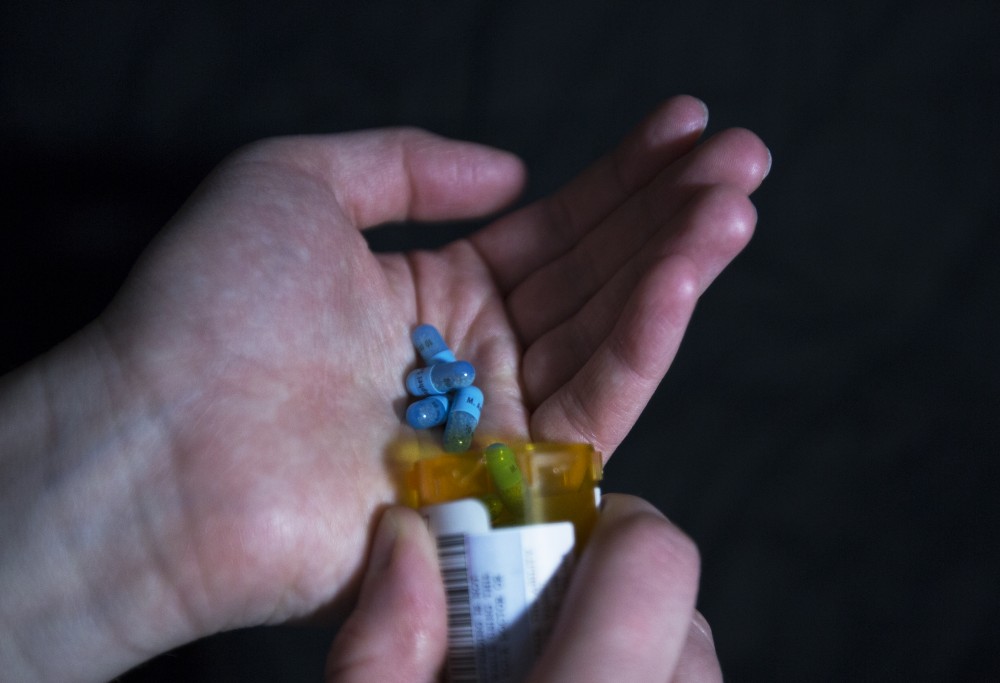GVPD highlights the importance of substance control

GVL / Kevin Sielaff – Adderall, as pictured above, is one of the most widely abused perscription drugs on college campuses nationwide.
Feb 11, 2016
Though Michigan law prohibits individuals under the age of 21 from purchasing, consuming or possessing alcohol, the Grand Valley State University Police Department (GVPD) and university administration are aware of a very key fact about college campuses: Underage drinking and recreational drug use are occurring.
In order to combat the fear that is traditionally associated with contacting emergency personnel in the case of a medical emergency of an underage individual, the state of Michigan adopted medical amnesty in 2012 to remove barriers when calling for or seeking help.
Under this law, any individual who is younger than 21 years of age and seeks medical assistance for himself or herself or is presented for assistance by another individual because of a prescription drug or alcohol overdose will be exempt from receiving a police citation for underage drinking.
Since the implementation of medical amnesty in 2012, there has been an increase in the willingness of underage individuals to report instances of medical emergency. It should be noted that even prior to this law, GVPD had not been issuing citations to those who were in crisis for alcohol poisoning. However, there is still work to be done on that front, said GVPD Capt. Brandon DeHaan.
One aspect of medical amnesty that has not seen as much attention is the fact that the law now applies to instances of prescription drug overdose. Ultimately, any minor who initiates contact with law enforcement or emergency medical services personnel for the purpose of obtaining medical assistance for a prescription drug overdose qualifies for amnesty.
The drug-related aspect of this law is specific for prescription drugs. Often those in a younger population may be experimenting with different drugs and find themselves in a crisis or overdose situation. If someone experiences a dangerous situation involving drugs, they are encouraged to contact authorities, specifically 911.
“If we get an emergency call we’ll respond to medical well-being first,” DeHaan said. “It is important for first respondents to know the correct information as soon as possible.”
The thought process behind the law is to encourage those who find themselves in a compromising situation under the legal age of consumption to contact authorities at the first sign of danger. In some cases reported to the police, individuals wait until it’s too late to call for help.
“The concern with any overdose situation is that there may be too much of an intoxicating substance on board that could just shut down the body,” DeHaan said. “We have also have observed instances where people vomit and choke if they are not on laying on their side or are not monitored to the extent they should be because someone is also under the influence.”
Sgt. Jeff Stoll of GVPD has been working for the university since 2007. Stoll has been trained as what is called a Drug Recognition Expert (DRE). DREs are trained to recognize signs of impairment in those under the influence of drugs other than or in addition to alcohol and to identify the type of drug or drugs impairing them. DREs use a 12-step evaluation process to help determine what drugs an individual may be under the influence of.
“I can help out by identifying problems as we see them,” Stoll said. “Student safety is our main goal and this is one way we can work toward that goal.”
Often, DREs can assess a situation and find details that weren’t apparent before.
“Prevention is key,” Stoll said. ” We can determine signs and behaviors of people under the influence of these types of drugs as well as provide the support needed during an emergency.”























